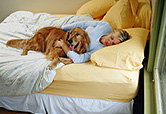 |
 |
 |

In the World of Germs, Man Bites Dog
Study finds owners had more multiple drug-resistant strains than their pets|
|
HealthDay
By Robert Preidt
Wednesday, January 28, 2009
 WEDNESDAY, Jan. 28 (HealthDay News) -- People who let their dogs sleep with them or allow them to lick their faces are no more likely than other dog owners to have the same strains of E. coli bacteria as their dogs, a Kansas State University veterinarian reports.
WEDNESDAY, Jan. 28 (HealthDay News) -- People who let their dogs sleep with them or allow them to lick their faces are no more likely than other dog owners to have the same strains of E. coli bacteria as their dogs, a Kansas State University veterinarian reports.
Dr. Kate Stenske, a clinical assistant professor at the university's College of Veterinary Medicine, said it's known that diseases can be shared between dogs and people and that about 75 percent of emerging diseases are transferable between humans and other animals.
She decided to focus on E. coli, which is common in the gastrointestinal tracts of both humans and dogs.
For the study, Stenske analyzed fecal samples from dogs and their owners. She found that 10 percent of human-dog pairs had the same E. coli strains and that these strains were more resistant to common antibiotics than expected. However, owners had more multiple drug-resistant strains than their dogs.
"This makes us think that dogs are not likely to spread multiple drug-resistant E. coli to their owners, but perhaps owners may spread them to their dogs," Stenske said in a university news release. "What we learn from this is that antibiotics really do affect the bacteria within our gastrointestinal tract, and we should only take them when we really need to -- and always finish the entire prescription as directed."
There was no evidence that owners who sleep with their dog or allow face licking were more likely to have shared strains of E. coli, according to the study, which was expected to be published in an upcoming issue of the American Journal of Veterinary Research.
However, the study did find an association between antibiotic-resistant E. coli and owners who didn't wash their hands after petting their dogs or before cooking meals.
"We should use common sense and practice good general hygiene," Stenske advised.
She said the finding that close human-dog bonding behaviors aren't more likely to spread germs is good news because of the physical and psychological benefits of pet ownership. Surveys show that nearly half of all dog owners share their food with their dogs, and more than half allow their dogs to sleep with them and lick their face.
"If you look at one study, 84 percent of people say their dog is like a child to them," Stenske added.
Future research might look at cat owners and shared E. coli. More Americans own cats than dogs, and cats interact with people in different ways than dogs, Stenske noted.
HealthDay
Copyright (c) 2009 ScoutNews, LLC. All rights reserved.
Related News:
More News on this Date
Related MedlinePlus Pages:
| Home | Health Topics | Drugs & Supplements | Encyclopedia | Dictionary | News | Directories | Other Resources | |
| Disclaimers | Copyright | Privacy | Accessibility | Quality Guidelines U.S. National Library of Medicine, 8600 Rockville Pike, Bethesda, MD 20894 National Institutes of Health | Department of Health & Human Services |
Date last updated: 29 January 2009 |




